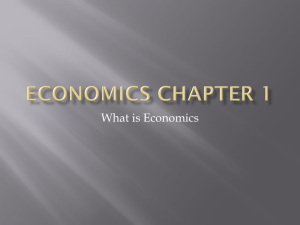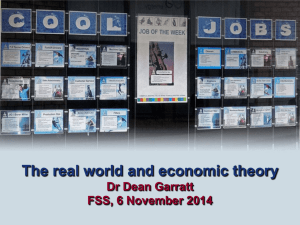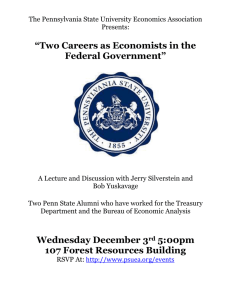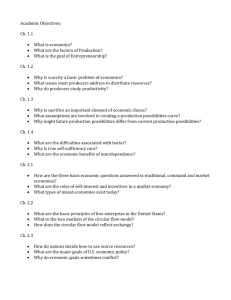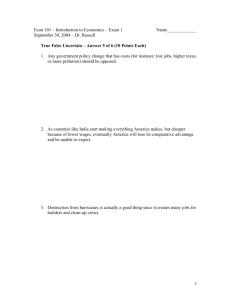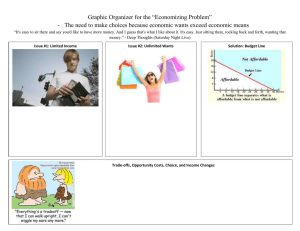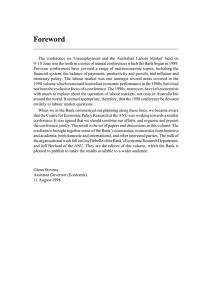Ethics, Distribution, Incentives, Efficiency and Markets
advertisement
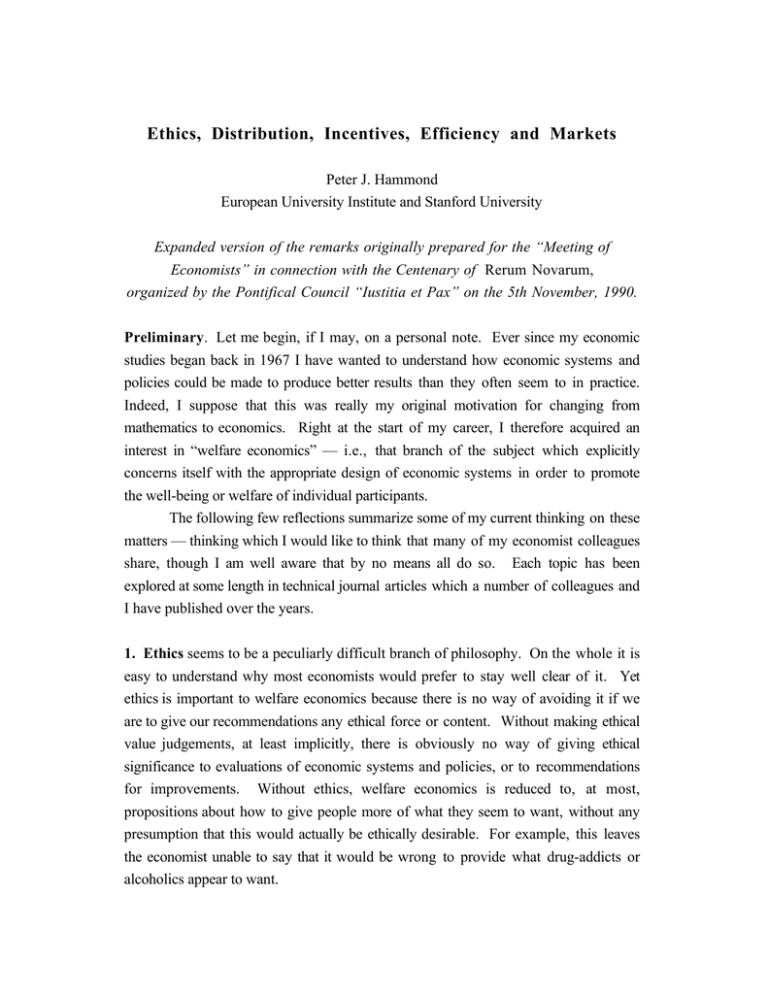
Ethics, Distribution, Incentives, Efficiency and Markets Peter J. Hammond European University Institute and Stanford University Expanded version of the remarks originally prepared for the “Meeting of Economists” in connection with the Centenary of Rerum Novarum, organized by the Pontifical Council “Iustitia et Pax” on the 5th November, 1990. Preliminary. Let me begin, if I may, on a personal note. Ever since my economic studies began back in 1967 I have wanted to understand how economic systems and policies could be made to produce better results than they often seem to in practice. Indeed, I suppose that this was really my original motivation for changing from mathematics to economics. Right at the start of my career, I therefore acquired an interest in “welfare economics” — i.e., that branch of the subject which explicitly concerns itself with the appropriate design of economic systems in order to promote the well-being or welfare of individual participants. The following few reflections summarize some of my current thinking on these matters — thinking which I would like to think that many of my economist colleagues share, though I am well aware that by no means all do so. Each topic has been explored at some length in technical journal articles which a number of colleagues and I have published over the years. 1. Ethics seems to be a peculiarly difficult branch of philosophy. On the whole it is easy to understand why most economists would prefer to stay well clear of it. Yet ethics is important to welfare economics because there is no way of avoiding it if we are to give our recommendations any ethical force or content. Without making ethical value judgements, at least implicitly, there is obviously no way of giving ethical significance to evaluations of economic systems and policies, or to recommendations for improvements. Without ethics, welfare economics is reduced to, at most, propositions about how to give people more of what they seem to want, without any presumption that this would actually be ethically desirable. For example, this leaves the economist unable to say that it would be wrong to provide what drug-addicts or alcoholics appear to want. Centenary of Rerum Novarum; meeting of economists Peter J. Hammond Even more important, without ethics one cannot decide such important policy questions as the following. Suppose that a specific improvement in public health services or some other welfare program is being contemplated, where it is understood that the extra costs will be met by a general increase in rates of income taxation. Typically the rich will lose more from higher income taxes than they will gain from better public health services, whereas the poor will gain more from the improvements in those services than they will lose from having to pay a little more income tax. In the absence of ethical value judgements, there is no way to weigh the gains of the poor against the losses of the rich in order to decide which are more important and so whether such a policy change is desirable or not. 2. Economic welfarism is a particular and very special ethical value judgement. It judges economic systems solely on the basis of what goods and services individuals are able to enjoy, and of what labour services and resources they are required to supply. Indeed, it assumes that: (a) in the end, it is only the allocations of goods, services, and tasks to individual consumers and workers which is ethically relevant; (b) individuals behave in a way which maximizes their own welfare — in the sense that they choose what it is right for them to have, provided that nobody else is unduly deprived as a result. Notice how (a) in the above definition specifically excludes any consideration of whether individuals’ rights to choose are respected. It also pays no attention whatsoever to any feelings which individuals may have that they would rather earn what they get instead of having it be provided directly through some welfare program of public assistance or through charity. Part (b) of the above definition of economic welfarism involves what is often called “consumer sovereignty” — it is assumed that consumers behave in a way that reveals their preferences, and also that they prefer what is better for them. Denying part (b) is a form of paternalism, of course. Yet who is to say that no kind of paternalism can ever have an ethical justification? This particular value judgement of economic welfarism has become standard in welfare economics and in most discussions of economic policy. What is being left out are many ethical considerations which may be important even in economics, such as the understandable desire of most people to be free of tax gatherers, customs officers, (potentially) corrupt bureaucrats, and tax systems which are far too complicated for even most intelligent and well trained people to be able to understand fully. Of course, part of this desire surely arises because people believe that they would be paying less to the governments of the world, and would be better off as a result, if there were fewer tax gatherers, customs officers, bureaucrats, and unnecessarily complicated Centenary of Rerum Novarum; meeting of economists Peter J. Hammond regulations. If this were all that lay behind such desires, however, there would be no very good reason for economists to go beyond the ethics of economic welfarism. Yet it seems that in addition many individuals really would value freedom for its own sake, even if policies which added to their freedom would also make the allocation of resources no better, or even somewhat worse. Despite this fact, I am still willing to accept provisionally the ethics of economic welfarism on the grounds that there are so many other pressing issues worth discussing which may be more important. Also, economists obviously have a much greater claim to expertise about the effects of policy changes upon economic welfare than their effects upon any more general ethical values. 3. Interpersonal comparisons of well-being are another kind of ethical value judgement, to be used in conjunction with economic welfarism as discussed under item 2 above. They concern not just comparisons of who is better or worse off, but also comparisons of the gains and losses of different individuals which result from a policy change. As already mentioned under item 1 above, the latter kind of comparison seems inevitable if one is ever going to discuss the merits of such economic reforms as increased income taxes being used to finance a better public health service which will clearly benefit some individuals at the expense of others. Otherwise, without such comparisons, there is absolutely no procedure for weighing the gains of some individuals against the losses of others. Much welfare economics has impoverished itself by seeking to avoid interpersonal comparisons altogether. As a result it has been limited to identifying those (all too rare) “Pareto” improvements in which everybody gains. Economists are probably right in remaining reluctant to consider how gains and losses should be compared, since the ethics involved does lie rather beyond their usual field of competence. Nevertheless, it is not clear whether it lies within anybody else’s usual field of competence either. So if economists are not willing to discuss this important question, who else is going to? In the meantime, until some more generally agreed procedure for comparing different individuals’ gains and losses has emerged, economists should at least tell the world who is likely to gain and who is likely to lose from any suggested policy change. And also how large different individuals’ gains and losses are likely to be. Then everybody, including any interested non-economists, can make their own comparisons and form their own opinions based on much better information than is usually the case at present. 4. Total wealth maximization is a rather commonly used criterion for making the interpersonal comparisons which are usually required in order to be able to compare Centenary of Rerum Novarum; meeting of economists Peter J. Hammond different economic policies. The criterion involves simply adding up different individuals’ indices of real wealth, or some alternative monetary measures of wellbeing. Then that policy is recommended which would make total wealth as large as possible. In this way different individuals’ gains and losses are simply reduced to monetary values, and then get added up in order to determine the total net gain, which must be equal to the (net) increase in total wealth. No attempt at all is made to see how gains and losses are distributed between rich and poor, or between individuals who are less or more deserving. This procedure therefore amounts to “one dollar, one vote” instead of “one person, one vote.” It is a very particular way of making interpersonal comparisons on the basis of wealth alone. It equates the extra money which a rich man wants to spend on a superior bottle of wine to the same sum of money which a poor mother needs in order to buy medicine which will save the life of her child. For this reason, most people would clearly find it ethically unacceptable. You may notice that I have carefully avoided calling it an “ethical” criterion. Yet too many economists in the past have become accustomed to making interpersonal comparisons in this way. Indeed, it is precisely this kind of value judgement which lies behind the usual comparisons of economic performance simply on the basis of GNP or national income statistics. Of course, some economists do claim that, if more total wealth becomes available to a community, then some of that increase can be relied upon to “trickle down” or otherwise be redistributed so that all do benefit in the end. “A rising tide raises all boats,” is an expression I have often seen and heard in recent years. But we should be concerned to see that some such redistribution actually occurs as an essential part of any change which we recommend. Otherwise, when the tide rises, some boats which may have become irretrievably stuck in the mud when the tide was low will not be able to rise, but will sink and even drown any occupants they may have who are unable to escape. We should not simply presume that, even if the economy is left to itself, compensating redistribution will automatically occur later on. It is also becoming generally accepted that we now live in a world economy which exhibits gross distributive injustice. This being so, there is no good ethical reason I can see why we should consider only those changes that happen to do no harm to anybody, including those people now fortunate enough to be relatively rich. Instead, one should be no less willing to consider policies that benefit the many poor, even if the rich are thereby forced to make some sacrifices which they can probably well afford. Obviously the rich are more able to afford sacrifices than the poor, and it is certainly right to bear this in mind when considering what kind of policy changes are worth careful examination. Centenary of Rerum Novarum; meeting of economists Peter J. Hammond 5. The perfect market systems of standard textbooks in economic theory would have to overcome numerous practical difficulties before their supposed benefits could actually be achieved in full. All problems concerning pollution and other abuses of the environment would have to be resolved by means of suitable payment schemes. In effect, resources like clean air and water in each locality would have to cease being treated as if they were public goods, for which it is unfortunately typical that nobody in particular feels responsible. Instead, they would have to be converted into some kind of private good owned by a clearly identified individual or institution. Moreover, that owner would have to be given the right to charge for using (or abusing) that resource, as well as some method of collecting the appropriate payments. In a similar way, traffic congestion would have to be properly controlled by charging drivers, pedestrians, and others for the use they make of the road network. In other words, if I may use the standard economists’ jargon, all external effects should be internalized by creating markets which control the activities that produce these effects. In addition, a perfect market economy requires in effect that all consumers should draw up complete lifetime plans for their patterns of expenditure at all future dates and in all possible different circumstances. Then they would be expected to invest in appropriate financial securities which can make these lifetime expenditure plans viable for sure, without any risk that their plans could not be carried out later on because of some unforseen event or some unanticipated changes in prices or rates of interest. All firms would have to make similar plans for the whole of their lifetimes, after allowing for any changes of management which there may be in the future. In fact, the practical difficulties which this requirement creates are obviously so great that the theoretical ideal remains completely unattainable. Of course, such difficulties are likely to be an intrinsic part of any economic system, be it market oriented, centrally planned, or of some other form. What should be clearly understood, however, is that all systems have their inevitable imperfections, and that we should be looking for that system whose imperfections are the least intolerable. This could well turn out to be some kind of market system, but to date I am aware of no satisfactory demonstration that a pure market system really is superior to a suitably designed mixed economy. Indeed, much of the recent work I am aware of seems to suggest precisely the opposite. A rather deeper criticism of even the most perfect market systems can be made, however. Although they would certainly allocate resources efficiently, there need not be much distributive justice in the outcomes which result. Indeed, a perfect market system by itself would be totally incapable of remedying even gross distributive Centenary of Rerum Novarum; meeting of economists Peter J. Hammond injustice. Such a system is entirely compatible with having all wealth concentrated in very few hands. Actually, to take an extreme case, even dictatorship is “efficient,” in the usual sense in which economists use that term, provided that the dictator is made as well off as possible by using all the economy’s resources in order to maximize his personal benefit. To take another but less extreme case, a perfect market system does not even guarantee the survival of the economically weakest unless they happen to have sufficient labour power or other resources to contribute to the economy. Otherwise, if they had too little, their failure to survive would actually be efficient in the sense that is generally accepted by economists. This is because they could not afford to go on living without some other people who are more fortunate having to make some sacrifices. 6. Equity and efficiency could nevertheless be considered separately, as they have been in most economics textbooks, if wealth could somehow be costlessly redistributed from those who already have plenty to those most in need. One could then arrange that the economic system always produces some efficient allocation of resources between consumers and producers, and then use redistributive transfers to alleviate any remaining distributive injustice which is ethically unacceptable. This, however, overlooks the inevitable difficulties which arise because any such wealth redistribution is bound in practice to affect incentives to work, save, buy insurance, acquire skills, run profitable enterprises, take reasonable precautions against personal accident or misfortune, etc. 7. Incentives are virtually always damaged by redistribution, in fact. The truly needy, who have become poor through absolutely no fault of their own (or of their families), are almost impossible to tell apart from those relatively few undeserving individuals who may have brought (apparent) poverty upon themselves in order to exploit whatever program of public assistance which the economic system may make available. Schemes to assist the needy therefore risk blunting the incentives for individuals to remain able to support themselves. On the other hand, the taxation schemes which are needed to finance such welfare programs must also reduce the incentives to earn extra income because there must be at least some points in the income scale where those whose extra efforts make them a bit richer find themselves liable to pay more taxes. That is, there must be some points in the income scale where a transition occurs between being a poor person who receives public support, and a person rich enough to pay taxes which go, at least in part, in order to provide such Centenary of Rerum Novarum; meeting of economists Peter J. Hammond support. Of course, taxes are generally arranged so that they rise steadily with income over a large range of income levels. In fact, since true skills and needs are not publicly observable, any economic system can only care for the truly needy by providing benefit programs which are inevitably vulnerable to exploitation by some dishonest people who do not really need them. An economic system can also use only those labour services which it provides strong enough incentives for individuals to supply. 8. Economic efficiency has traditionally been defined, following Vilfredo Pareto, as meaning that no feasible reallocation of resources could make all individuals in the economy better off — or at least that no such reallocation could possibly make some individuals better off without making some others worse off. This was the sense which I myself was using in discussing items 5 and 6 above. It has nearly always been interpreted in a way which ignores the fact that redistribution is almost sure to blunt incentives. A truly efficient economic system is actually one which makes efficient use of all the economy’s scarce resources, including the (generally very limited) information upon which suitable redistribution schemes can be based. This limited information imposes “incentive constraints” upon what is truly feasible, of the kind mentioned under item 7 above. It is accordingly imperative, in my view, that economists change completely their understanding of what “efficiency” should actually mean, especially when they consider allocations of goods and services to individual consumers. Among such allocations, most of those which lie on the “efficiency frontier” of the standard textbooks take account only of physical constraints. These concern what individuals are able to supply, and what can be produced with those supplies. They also include the inevitable “resource balance” constraints which reflect the obvious need to meet consumption demand out of what producers can supply, and to have workers provide whatever labour services producers need. In fact most points of this standard “physically constrained” efficiency frontier cannot be reached at all without using the theoretically ideal costless transfers mentioned in paragraph 6 above. Yet such transfers neglect the limited information upon which they can be based and the corresponding need to provide appropriate incentives to workers, managers, capitalists, etc. Accordingly, most allocations which are alleged to lie on this “full information” efficiency frontier of the standard theory could never be reached in actual practice, and so are in truth not feasible. For this reason, a more appropriate efficiency concept would seem to be that of “incentive constrained efficiency” — i.e., efficiency taking account not only of physical constraints on possible allocations of goods and Centenary of Rerum Novarum; meeting of economists Peter J. Hammond services to individuals, but also of those incentive constraints on redistribution and on the financing of public goods which arise because limited information makes it necessary to provide suitable incentives for individuals to participate properly in the economic system. 9. Incentive constrained efficient allocations are therefore the ones which, I claim, economists should really be considering. Usually such allocations cannot be achieved by means of even the most perfect market system. The only exceptions are those probably very unjust allocations which would emerge in a perfected and purified laissez faire market system, without any redistribution of real income or provision of any public goods. In such a laissez faire system, the incentive constraints limiting the redistribution of real income obviously do not matter. Also, because no public goods or services are being provided, there is also no need to worry about those incentive constraints which limit the ways in which taxes can be raised in order to finance the provision of such goods. 10. Distortions to the market system are an almost inevitable part of any economic system which seeks to remedy even the grossest distributive injustice, or even to provide certain desirable public goods and services at the most rudimentary level. The only truly possible schemes of public finance require so-called “distortionary” taxes and subsidies, which may nevertheless be part of an incentive constrained efficient economic system. Examples of such distortions include income taxes, value added taxes, agricultural subsidies, as well as state provision or funding of those goods like medical services, education, and pensions which could be arranged privately and voluntarily, but which the governments of most developed countries provide either entirely free or else with substantial subsidies to a significant fraction of their citizens. Only land redistribution comes close to the theoretical ideal of nondistortionary interference in the market. But even this creates problems if existing landholders come to believe that it could be repeated at some future date, since then they will be given an obvious incentive to neglect the long-term potential of the land which they fear may be confiscated in the near future. Indeed, distortionary intervention in the market system is virtually certain to be needed if any kind of ethically acceptable distribution of resources between people is to be achieved. Paradoxically, most truly incentive preserving schemes of taxation and subsidy involve market distortions and so depart from the usual economists’ theoretical ideal. Centenary of Rerum Novarum; meeting of economists Peter J. Hammond 11. Market forces have generally been regarded by economists in the past as always helping to allocate resources efficiently. Yet market forces may actually undermine desirable and even (incentive constrained) efficient distortions to markets, as when individuals seek to evade appropriately imposed taxes, to transact in the hidden economy, to deal in illegal drugs, or to become “economic migrants” in a country where their personal opportunities are greater but their contribution to the world economy is less. That is, market forces may actually make things worse by imposing extra constraints on the efficiency of those truly feasible allocations which realistic economic policies could actually be used to put into effect. Market forces make it necessary for modern economic systems to have tax inspectors, fraud squads, customs officers, drug enforcement agencies, etc. The only alternative would be completely unregulated markets which, as we have seen, by no means always produce desirable allocations. They also make it harder to achieve incentive constrained efficient allocations. The additional constraints which market forces themselves create might nevertheless become weakened if only economists could bring themselves first to admit and then to teach that, even in economics and business, greed is sometimes a sin. 12. Production efficiency is a much weaker concept than (full) economic efficiency. It simply requires that no more output of any good can be produced unless more inputs are made available, or unless less of some other output is produced. Alternatively, no less input of any good or service can be used without either substituting more of some other input, or making do with less of some output. Nothing at all is said, however, about whether those goods which do get produced are actually desired by consumers, nor about whether those goods get distributed efficiently or not. Distortions to the price system for producers are incompatible with production efficiency. Common examples of such distortions include tariffs and quotas which discriminate between domestic and foreign producers, as well as taxes on intermediate goods — i.e., those goods which are sold by one producer to another. Such distortions should be clearly distinguished from those like consumption or value added taxes, since the latter only distort the price system for consumers relative to producers. This they do by driving wedges between the prices for each good or service faced by consumers and the corresponding prices faced by producers. This partial criterion of production efficiency is more likely to be ethically acceptable on its own than the overall criterion that production and distribution together should be (Pareto) efficient in the classical full information sense. Indeed, we saw that there can be very good reasons for “distorting” the distribution of goods and services Centenary of Rerum Novarum; meeting of economists Peter J. Hammond to consumers in order to promote distributive justice by redistributing real wealth, or in order to finance the provision of desirable public goods. Nevertheless, there are far fewer reasons to organize the world’s production inefficiently. In fact, there is a “second best” case for production efficiency on its own. It relies on being able to justify efficiency enhancing policy reforms on the supply side of the world economy, such as freeing international trade, or abolishing unproductive enterprises in order to release resources needed by new ones which are more productive. In principle, the case for even production efficiency on its own generally requires that compensating arrangements be made for any deserving individuals who are unfortunate enough to lose their livelihoods when currently unproductive businesses cease to operate. It also involves ensuring that the former customers of a business that has closed can still receive adequate supplies from elsewhere. Nevertheless, moves towards increased efficiency in production are far from being automatically desirable. This is especially true as there may be no easy way of arranging compensation, without destroying important incentives, for any deserving individuals who have lost their jobs or businesses. Without such compensation being guaranteed, however, the argument for increased production efficiency suffers from the same inadequacies as the “trickle down” argument for wealth maximization which was criticized under item 4 above. Conclusion. The perfectly competitive market system described in most “Western” economics textbooks almost certainly needs to be considerably distorted if one is to achieve anything like an ethically acceptable level of distributive justice. There is in fact a clear sense in which, left to themselves, markets are much better at satisfying the wants of the rich than they are at meeting the needs of poor. This is quite apart from other market failures which have become more widely understood by economists, such as those due to incomplete markets, monopoly power, or concerns about the environment and other externalities. It is hard, but perhaps not quite totally impossible, to separate concerns for distributive justice from those of efficiency in production alone. It is virtually impossible, however, to separate equity from the overall efficiency of an economic allocation to both consumers and producers. Indeed, I claim that economists should even be using an entirely different notion of “incentive constrained” efficiency, allowing for the fact that there is only limited information which can serve as the basis for redistributive policies. Once this is generally understood, economists can give up the futile search for ways of making markets work “perfectly.” Instead they can settle down to the more useful task of finding out Centenary of Rerum Novarum; meeting of economists Peter J. Hammond how to organize a well functioning mixed economy, even recognizing that some markets may hinder rather than help in this process. If I had to summarize in just one (rather long) sentence what was needed in order to create an ethically acceptable economic system, this might be it: Organize production reasonably efficiently by measures such as encouraging fair competition and using market forces on the supply side of the world economy, but be sure to intervene judiciously on the demand side of markets in order to ensure that the resulting goods, services, and job opportunities are distributed as justly as possible, while bearing in mind the crucial need to preserve incentives in order that individuals, firms, and other organizations should all be encouraged to create desirable outputs and to acquire and deploy useful skills.
